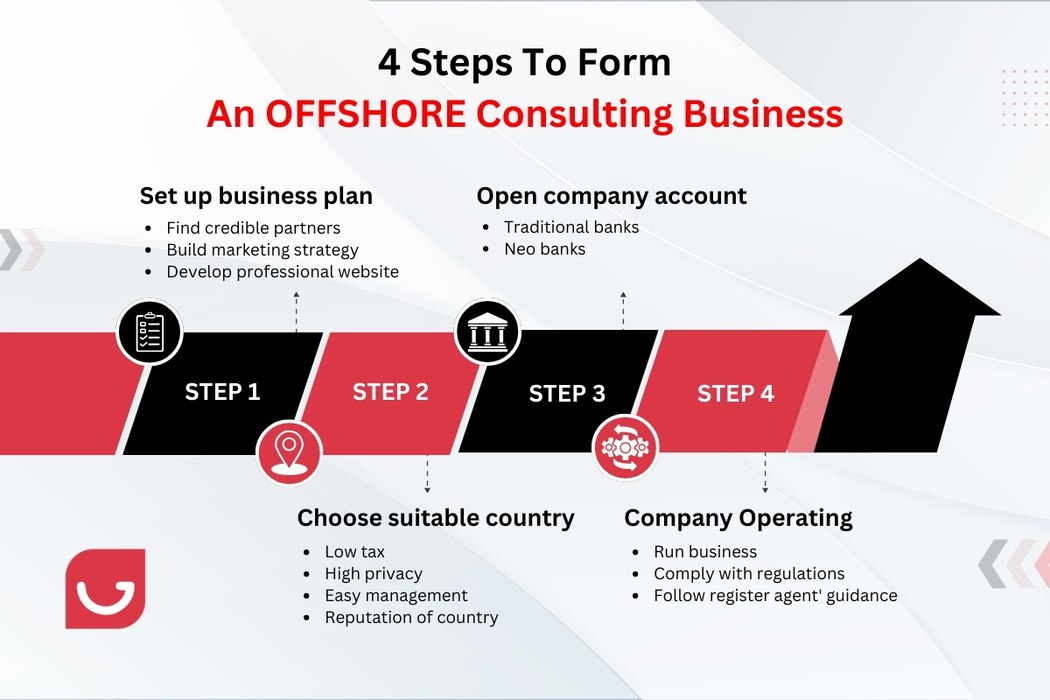The Definitive Blueprint for Effective Offshore Company Formations
Exactly How Offshore Firm Formations Job: A Step-by-Step Summary for Business Owners
Offshore company formations can provide significant advantages for business owners seeking tax obligation optimization and asset security. The procedure involves several important actions, starting with cautious jurisdiction option and comprehensive documentation prep work. Involving expert solutions is essential for conformity. Lots of ignore the recurring responsibilities that follow preliminary registration. Comprehending these intricacies can make a substantial distinction in leveraging overseas chances effectively. The next actions are vital for long-term success.
Comprehending Offshore Business: What They Are and Why They Matter
Although the concept of overseas firms may appear complex, understanding their fundamental nature and value is necessary for both people and services seeking to optimize their economic approaches. Offshore companies are entities registered outside the individual's nation of home, typically in territories that offer desirable governing settings. These services can supply various benefits, such as tax optimization, property defense, and enhanced privacy.
For entrepreneurs, developing an overseas company can assist in global trade, decrease operational expenses, and broaden market reach. Additionally, overseas business usually enable structured conformity with global guidelines. People might also make use of overseas frameworks to safeguard personal properties from financial or political instability in their home countries. Ultimately, the allure of overseas companies depends on their capacity to boost economic versatility and offer strategic advantages in a significantly interconnected international economic situation - Offshore Company Formations. Understanding their operational structure and benefits is important for making informed decisions
Choosing the Right Territory for Your Offshore Firm
Choosing the suitable jurisdiction for an offshore business is essential for making the most of tax advantages and making certain compliance with local regulations. Various territories offer varying tax obligation rewards and regulative atmospheres that can substantially impact company operations. Subsequently, a mindful analysis of these factors is essential for notified decision-making.
Tax Obligation Advantages Review
When considering the facility of an overseas firm, recognizing the tax benefits related to numerous territories is crucial. Different locations provide distinct benefits, such as low or absolutely no corporate tax obligation prices, which can greatly enhance earnings. Some territories offer tax motivations for details sorts of businesses, drawing in entrepreneurs seeking reduced tax liabilities. In addition, particular countries implement positive tax obligation treaties that lessen double taxation on global income, making sure that businesses maintain even more revenues. The choice of jurisdiction likewise impacts value-added tax (VAT) and various other regional taxes. Business owners have to review these variables very carefully to pick a place that straightens with their company goals, maximizing tax effectiveness while continuing to be certified with international guidelines.
Regulatory Environment Considerations
Selecting the ideal territory for an overseas company needs a thorough understanding of the regulative atmosphere, as various countries impose varying degrees of conformity and governance. Business owners must evaluate variables such as lawful frameworks, tax obligation regulations, and reporting commitments. Territories like the British Virgin Islands and Cayman Islands are commonly favored for their business-friendly legislations and minimal reporting demands. Conversely, some nations may enforce strict policies that can make complex operations and enhance prices. In addition, the political security and reputation of a jurisdiction can impact the lasting stability of the overseas business. Subsequently, cautious factor to consider of these regulative elements is necessary to ensure that the selected jurisdiction aligns with the business's strategic goals and functional requirements.
Preparing the Required Documents
Preparing the needed documentation is a necessary step in the overseas company formation procedure. Entrepreneurs need to gather different lawful and recognition documents to promote their company's facility in an international territory. Usually, this consists of a thorough company plan describing the company's purposes and operational approaches. Furthermore, personal recognition documents, such as passports or driver's licenses, are required from the firm's shareholders and directors.
In a lot of cases, proof of address, like utility bills or financial institution declarations, is required to confirm the identities of the included celebrations. Moreover, particular types determined by the territory, including application kinds for enrollment, need to be completed accurately. Some jurisdictions may likewise call for a statement of the nature of business activities and conformity with neighborhood guidelines. Completely preparing these records guarantees a smoother registration process and assists minimize possible hold-ups or complications, eventually setting a strong foundation for the offshore entity.
Engaging Specialist Services for Offshore Development
Engaging professional solutions in overseas development can considerably boost the efficiency and efficiency of the process. Entrepreneurs usually face intricacies that can be frustrating, making professional assistance indispensable. Professional companies concentrating on offshore formations provide a wide range of knowledge pertaining to territory selection, firm framework, and neighborhood market problems.
These specialists can assist in preparing vital documents, guaranteeing precision and compliance with details needs. They also aid improve interaction with neighborhood authorities, reducing the probability of delays or misunderstandings. Furthermore, specialist solutions can provide insights right into tactical benefits, such as tax advantages and asset defense, tailored to the business owner's specific needs.
Navigating Regulatory Conformity and Legal Demands
Understanding the regulatory landscape is important for entrepreneurs starting on offshore business developments. Compliance with regional regulations and international regulations is vital to prevent legal challenges. Each territory has particular demands pertaining to firm enrollment, reporting, and tax, which must be extensively investigated.
Entrepreneurs ought to acquaint themselves with the policies controling company structure, possession, and operational practices in the selected offshore area. Furthermore, anti-money laundering (AML) and understand your consumer (KYC) policies usually apply, needing proper paperwork and confirmation procedures.
Involving with lawyers who concentrate on offshore services can supply important guidance on maneuvering with these intricacies. Making sure conformity not only safeguards the firm from possible lawful problems yet also enhances reliability with companions, investors, and regulators. By sticking to the proposed lawful frameworks, business owners can efficiently take advantage of the benefits of offshore business formations while lessening risks connected with non-compliance.
Setting Up Financial and Financial Accounts

When an appropriate bank is determined, entrepreneurs typically need to prepare and send numerous records, consisting of evidence of identification, business registration records, and a summary visit their website of the designated company tasks. (Offshore Company Formations)
Some banks may likewise require a minimum deposit to open up an account. Entrepreneurs ought to be prepared to address inquiries regarding the source of funds and service operations. By thoroughly comprehending the banking landscape and abiding by the financial institution's demands, business owners can secure their offshore company has smooth accessibility to crucial monetary services for effective operation.
Preserving Your Offshore Firm: Recurring Duties and Finest Practices
Preserving an offshore company involves a number of continuous duties that are vital for conformity and functional honesty. Trick aspects include sticking to annual conformity demands, keeping precise monetary records, and recognizing tax obligation commitments. These aspects are important for ensuring the firm's longevity and lawful standing in its jurisdiction.
Yearly Conformity Needs
While establishing an overseas business uses many benefits, it also involves recurring obligations that can not be overlooked. Yearly compliance needs differ by territory however normally consist of submitting annual returns and financial statements to local authorities. Firms have to also pay annual costs, which can include registration renewals and taxes, depending upon the area. On top of that, several territories require preserving a registered workplace and a neighborhood representative. Failure to abide with these policies can lead to charges, consisting of penalties and even dissolution of the firm. Business owners must also know any type of modifications in neighborhood regulations that may affect their compliance obligations. Staying notified and arranged is necessary click here to find out more for maintaining the advantages of an overseas business while meeting legal obligations effectively.
Maintaining Financial Records
Conformity with annual needs is just part of the ongoing obligations related to overseas firm management. Keeping exact monetary records is crucial for ensuring transparency and responsibility. Business owners should systematically document all purchases, consisting of earnings, expenditures, and possessions. This practice not only help in inner decision-making yet likewise prepares the firm for potential audits from governing authorities.
On a regular basis updating financial declarations, such as profit and loss accounts and equilibrium sheets, is vital for tracking the business's economic health and wellness. Using bookkeeping software can simplify this process, making it much easier to generate records and maintain conformity. In addition, entrepreneurs need to take into consideration looking for expert accounting services to ensure adherence to neighborhood policies and best methods, thereby guarding the stability and reputation of their overseas procedures.

Tax Responsibilities Introduction
Steering with the complexities of tax commitments is essential for the effective administration of an offshore firm. Entrepreneurs must understand the tax laws of both their home country and the jurisdiction where the offshore entity is established. Compliance with local taxes laws is essential, as failing to adhere can cause charges or lawful concerns. On a regular basis filing essential tax returns, also when no tax might be owed, is frequently called for. Additionally, maintaining precise and current financial documents is imperative for showing conformity. Consulting from tax professionals acquainted with worldwide tax regulation can assist navigate these obligations effectively. By applying finest techniques, entrepreneurs can guarantee that their offshore procedures remain economically sensible and lawfully compliant.

Regularly Asked Inquiries
For how long Does the Offshore Firm Formation Refine Usually Take?
The overseas firm development process generally ranges from a couple of days to several weeks. Aspects affecting the timeline consist of jurisdiction, documentation demands, and responsiveness of legal and financial establishments associated with the setup.
What Are the Expenses Associated With Keeping an Offshore Business?
The prices connected with keeping an offshore business can differ widely. They commonly consist of yearly enrollment charges, compliance expenses, accounting solutions, and possible legal charges, depending on the jurisdiction and certain organization activities entailed.
Can I Open Up a Personal Bank Account for My Offshore Business?
Opening a personal checking account for an overseas business is typically not allowed. Offshore accounts should be business accounts, reflecting the firm's activities, thereby following guidelines and ensuring appropriate financial administration and legal accountability.
Are There Constraints on Foreign Ownership of Offshore Firms?

What Occurs if I Fail to Abide With Offshore Laws?
Failure to follow offshore regulations can cause serious fines, consisting of significant fines, loss of service licenses, and potential criminal charges. Furthermore, non-compliance might cause reputational damage and problems in future service procedures.
Offshore business are entities signed up outside the person's country of residence, usually in jurisdictions that supply beneficial regulative settings. Choosing the suitable jurisdiction for an overseas firm is crucial for taking full advantage of tax obligation benefits and guaranteeing compliance with neighborhood policies. When considering the establishment of an overseas company, comprehending the tax benefits linked with different jurisdictions is important. Choosing the ideal jurisdiction for an offshore firm requires a detailed understanding of the regulatory atmosphere, as various nations enforce varying levels of conformity and administration. Furthermore, the political stability and online reputation of a jurisdiction can affect the long-lasting feasibility of the offshore business.